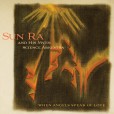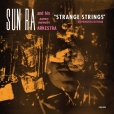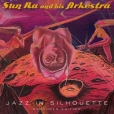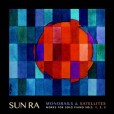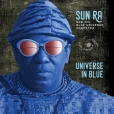Your basket is empty

A triumphant edition of one of the most implacable, mysterious, rumbustiously creative albums in the entire Saturn catalogue.
The three tracks comprising the original LP are remastered from tape, doing away with the distortion which has dogged all previous issues. The four additional recordings here are previously unreleased, including two more from the first sessions, and a live performance circa 1967, with Ra leading strange strings on clavinet, and finally a demonstration by Ra of the ‘plaintive’ expressiveness of the Ukrainian bandura.
With excellent notes, including a new essay by David Toop.
‘When I say space music, I’m dealing with the void, because that is of space, too; but I’m dealing with the outer void rather than the inner void, because somehow man is trapped into playing roles into the haven or heaven of the inner void… the word space is a synonym for a multi-dimension of different things other than what people might at present think it means. So I leave the word space open, like space is supposed to be.’
‘If you play it right time, you’re wrong,’ Sun Ra once instructed his Arkestra. ‘I told you, it’s designed for sound.’
From the original Saturn Research publicity flyer for Strange Strings: ‘Too many people are following the past. In this new space age this is dangerous… It is no accident that those who die are said to have passed since those who have PASSED are PAST.’
The two Saturns, from 1966; plus a third, previously-unreleased volume of five originals and four standards.
‘More of a collection of statements than a style. Some of the tunes, with their odd juxtapositions of mood, could be mistaken for silent film scores. Perhaps they were audio notebooks, a way to generate ideas which could be developed with the band. Regardless, they serve as compelling standalone works. The fingering reflects Sun Ra’s encyclopedic knowledge of piano history as his passages veer from stride to swing, from barrelhouse to post-bop, from march to Cecil Taylor-esque free flights, with a bit of soothing candelabra- swank thrown in. Sunny’s attack is mercurial, his themes unpredictable. His hands can be primitive or playful, then abruptly turn sensitive and elegant. As with the whole of Sun Ra’s recorded legacy, you get everything but consistency and predictability.
‘The listener also experiences something rare in the omniverse of Sun Ra recordings: intimacy. His albums, generally populated by the rotating Arkestral cast, are raucous affairs. With the Monorails sessions, we eavesdrop on private moments: the artist, alone with his piano.’
From 1972, with Ra on organ throughout — trading solos with Gilmore and trumpeter Kwame Hadi on the bluesy title cut; duetting with drummer Luqman Ali on In A Blue Mood. June Tyson stars on Blackman.

